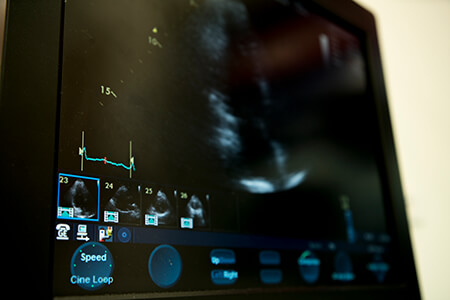The Importance of Echocardiograms
What They Are and Why They Matter

At its core, an echocardiogram utilises sound waves to generate real-time images of the heart’s structure and function. This imaging technique provides invaluable insights into various aspects of cardiac health, including:
- Assessing heart function
- Detecting structural abnormalities
- Diagnosing and monitoring heart diseases
- Guiding procedures and surgeries
Types of Echocardiograms
The type of echocardiogram you are provided with will depend on the information your healthcare provider needs. The different types of echocardiograms are:
- Transthoracic Echocardiogram (TTE): This is the most common type of echocardiogram. A transducer is placed on the chest wall to obtain images of the heart by emitting and receiving sound waves through the chest wall. It provides a comprehensive evaluation of the heart’s structure and function.
- Transoesophageal Echocardiogram (TEE): The transducer is inserted into the oesophagus to obtain clearer and more detailed images of the heart. TEE is particularly useful for assessing structures that are difficult to visualise with TTE, such as the back of the heart and certain valves.
- Stress Echocardiogram: This test combines echocardiography with exercise (treadmill or bicycle) or pharmacological stress (using medications that mimic the effects of exercise). It helps evaluate how the heart responds to stress and can detect areas of reduced blood flow to the heart muscle, indicative of coronary artery disease.
- Doppler Echocardiogram: Doppler echocardiography assesses blood flow through the heart and blood vessels by measuring the speed and direction of blood flow. It’s used to evaluate valve function, detect abnormalities in blood flow patterns, and assess the severity of valve stenosis or regurgitation.
The Importance in Clinical Practice
Echocardiograms have become indispensable for healthcare providers across various specialities, including cardiology, internal medicine, and primary care.
Detection and Prevention of Structural Abnormalities: Echocardiograms produce detailed images of the heart valves, walls, and chambers to aid in the detection of structural and cardiac abnormalities, such as valve defects, congenital heart conditions, and cardiomyopathies. This enables timely intervention to prevent the progression of heart disease. By identifying risk factors and subtle structural changes, healthcare professionals can implement preventative measures and lifestyle modifications to reduce the risk of adverse cardiovascular events.
Monitoring and Assessment of Heart Disease: Echocardiograms allow healthcare professionals to evaluate the heart’s pumping action which indicates how well the heart is functioning, as well as assessing the size and thickness of the heart chambers. Additionally, they can also monitor heart disease progression and evaluate the effectiveness of treatment. This helps healthcare providers make informed decisions about disease management and adjustments to therapeutic regimens.
Enhanced Procedural Safety: Echocardiograms enhance procedural safety by providing real-time visualisation of cardiac structures and guiding precise catheter placement or surgical manoeuvres. This minimises the risk of complications and improves procedural outcomes for patients undergoing interventions.
Paediatric Applications: Echocardiography is indispensable for diagnosing congenital heart defects, monitoring cardiac development in infants and children, and guiding surgical interventions. Its non-invasive nature and high-resolution imaging make it particularly well-suited for paediatric patients, facilitating comprehensive assessment and personalised management of paediatric cardiac conditions.
Echocardiograms are indispensable tools in modern cardiology, providing valuable insights into cardiac health and guiding clinical decision-making across a wide spectrum of cardiovascular conditions. Their non-invasive nature, accuracy, and versatility make them essential for delivering high-quality care to patients with heart disease.
